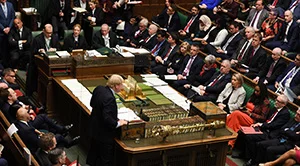 On April 27th, the UK Government finally issued its long-delayed White Paper on gambling aimed at bringing some much-needed reforms to the country’s gambling industry in order to make it more up-to-date with the newest developments in the sector, especially in terms of online gambling.
On April 27th, the UK Government finally issued its long-delayed White Paper on gambling aimed at bringing some much-needed reforms to the country’s gambling industry in order to make it more up-to-date with the newest developments in the sector, especially in terms of online gambling.
Last Thursday saw local lawmakers outline the largest shake-up of the UK gambling industry since 2005 with the announcement of some major changes focused on tackling problem gambling. As Casino Guardian reported at the time, Culture Secretary Lucy Frazer informed the Members of Parliament that the gambling regulations of the country needed to be brought into the present day, and the proposed updates to the 2005 Gambling Act would do that.
The White Paper on gambling sets out plans to introduce a statutory levy on gambling operators as part of an effort to provide additional funding to various public health initiatives, implement stricter affordability checks on players who show signs of problem gambling, and impose an online casino games stake limit of between £2 and £4 for younger audiences. The establishment of an independent ombudsman is also among the measures that have been proposed in the eagerly-awaited White Paper.
The review of the country’s gambling laws started in December 2020, with the process being delayed on multiple occasions due to the ongoing political crisis in the UK. As confirmed by Culture Secretary Ms Frazer, the proposals will be subject to a round of consultations, with the UK Gambling Minister Stuart Andrew saying that the actual changes are expected to be implemented by the summer of 2024.
Proposed Gambling Reforms Not as Harsh as Expected, Campaigners Say
 Apart from bringing “pre-smartphone regulations” into the present day and making both the authorities and customers more aware of unchecked gambling addiction, the largest overhaul of the country’s gambling laws in almost 20 years is expected to have other effects on the sector, too. According to official estimates, the Government’s move to impose further restrictions on the companies operating across the country, will result in a 3% to 8% decline in the gross gaming yield of the market, which was estimated at almost £10 billion in the year that ended on March 31st, 2022. Online gambling revenues, respectively, are expected to be reduced by 8% to 14%.
Apart from bringing “pre-smartphone regulations” into the present day and making both the authorities and customers more aware of unchecked gambling addiction, the largest overhaul of the country’s gambling laws in almost 20 years is expected to have other effects on the sector, too. According to official estimates, the Government’s move to impose further restrictions on the companies operating across the country, will result in a 3% to 8% decline in the gross gaming yield of the market, which was estimated at almost £10 billion in the year that ended on March 31st, 2022. Online gambling revenues, respectively, are expected to be reduced by 8% to 14%.
However, some campaigners were disappointed with certain aspects of the UK lawmakers’ proposals, as they did not go as far as preliminary anticipated.
At the time when the White Paper was unveiled, Ministers shared that they are set to have further consultations on stake limits for younger gamblers, aged between 18 and 25, because the group has been found to be particularly susceptible to gambling-related harm. According to reports, such limits could see the bets restricted to £2 to £4, or based on individual risk.
The gambling stakes for older gamblers could be subject to stake limits of up to £15 – which is a value larger than the limits that have been already voluntarily imposed by a number of operators, including gambling group Flutter Entertainment, which has already imposed a blanket stake limit of £10.
Reportedly, an earlier version of the White Paper that has been prepared by the Government of former Prime Minister Boris Johnson in the summer of 2022 would have proposed a limit of between £2 and £5. For the time being, the reason behind the decision of the Government to boost the initially suggested gambling stake limits remains unknown.
Some campaigners, however, have already criticised the lawmakers, saying that the efforts of some gambling companies to have many Members of Parliament on their side by making political campaign contributions and offering personalised enticements such as gifts and hospitality to lawmakers in order to guarantee their interests will be represented and defended in local Legislature.
British Lawmakers Blamed for Links to the Local Gambling Industry
 As Casino Guardian previously reported, the gambling industry in the UK has experienced massive growth in recent years. At the same time, the companies have invested more money into lobbying efforts to guarantee themselves the necessary support in the local Legislature.
As Casino Guardian previously reported, the gambling industry in the UK has experienced massive growth in recent years. At the same time, the companies have invested more money into lobbying efforts to guarantee themselves the necessary support in the local Legislature.
According to the register of Members of Parliament’s financial interests, dozens of lawmakers from both the Conservative and Labour Party have received £200,000 in gifts and hospitality between 2021 and 2022 in return for their support to gambling operators.
In April, Conservative backbencher Scott Benton got suspended from the party after an undercover investigation of The Times that found him offering his help and an advance copy of the Government’s White Paper to fake gambling industry representatives in return for a payment. Following the suspension, the co-founder of the Gambling with Lives charity, Liz Ritchie, noted that the reforms showed campaigners that they had managed to win the battle against a powerful gambling lobby but there was still a long way to go.
Despite the newly-unveiled restrictions that aim at putting some limits on the UK gambling sector, some people were still disappointed by the lawmakers’ proposals which, according to them, were not strict enough to ensure maximum protection for consumers. Some of them have criticised the sector saying it was predatory and had to be brought to heel, while others blamed the Tories for being extremely greedy and their policy, saying they have to educate themselves by doing some research on compulsive gambling before gambling with other people’s lives. The connections of some members of the Conservative Party to the gambling industry, along with alleged corruption, privatisation, and rising costs of living have been pointed out as some of the main factors that have a negative effect on the country’s future.
Some British consumers shared an opinion that any industry that is required to spend a significant part of its advertising warning customers of the potential harms and dangers of doing what is essentially the subject of the company’s operation. While compulsive gambling is a serious issue, gambling operators have been blamed for preying on problem gamblers, destroying their lives and the lives of their families only to win money.
- Author


